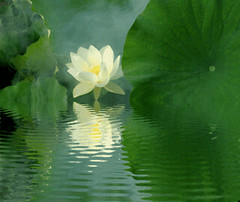Walking Towards the Horizon
To translate the title Daodejing, one must first have a basic understanding of the book itself. The discussion in the book could roughly be divided into two parts: one about dao, and one about de. While there are hundreds of different translations of the book, people’s translations of dao are more or less the same: many as “way, path, etc”, most just leave it alone. Many scholars, however, disagree on the translation of de. So my first attempt to translate the title is by rendering a felicitous translation of de. But I failed because as I was looking for evidences in the book to support my translation I find it impossible to discuss, let alone having a clear understanding of, de without looking at it along with “dao, wuwei, wuming”. In the same way, it is impossible to discuss any of the other three terms without viewing the rest.
While it is difficult to give a translation straight away, it is relatively clear to me what kind of ideas I want to convey in my translation. First, the dao should be a word that could be used both as a verb and a noun. Second, the direction of the dao should be toward something good and grand. Because no matter how de is translated, it could by no means be defined as vice or evil. And since the book mainly talks about cosmos and governing, the dao should be broad enough to carry tian. Third, the approach to dao and de is natural/ spontaneous and noncoercive. Fourth, the title should suggest a sense of continuity and transforming. The former two is easy to accomplish in a translation, whereas it is difficult to find the English equivalency of dao and de that can express the meaning of both naturalness and transforming.
Eventually, I came up the translation “Walking Towards the Horizon”. This is by no means the best translation, however, I believe it is a more expressive translation than most other ones.
“Walking” gives a sense of spontaneous progressing, and it constant with one meaning of dao as road. “Towards” gives a sense of direction, suggesting it’s moving along the direction to something good. The word “horizon” is far from what generally held as de, but I think it is this word that livens the whole translation up.
When you think about horizon, what comes into your mind? Grand, endless, sun-rise and sunset, the sky meets the earth. At the same time, though it doesn’t say anything about virtue or moral, it gives people a feeling of magnificence and greatness. This is because, as far as I’m concerned, people are usually in awe with something grand, and moreover, people have the presumption that tian is always virtuous and right. Such assumptions could be seen from a number of Chinese Classics, including the ones we learnt, namely Zhongyong, in which it discusses people’s natural tendencies as given by the heavens. One interesting aspect of this is the fact that the horizon did nothing to make itself magnificent or great yet is perceived so is consistent with Daodejing’s notion of “wuwei and therefore achieve greatness”.
In addition, because no matter for how long you walk towards the horizon, it never ends and is forever expending/ stretching forward; this can give you a sense of continuity. It is also interesting to ask when that happens whether you have really got closer to the horizon or not? The answer of this question maybe find in the book’s discussion of youwei and wuwei. Furthermore, youwei and wuwei, just as the sunrise and sunset, is forever transforming from one to another.
Another reason why I propose the translation “Walking Towards the Horizon” is that I believe nothing can better put human being, the earths and the heavens into context than the picture of human beings walking towards the horizon.
From my above explanation, you could see that I place much importance on spontaneity, noncoerciveness, continuity and transforming. It is because I believe Daodejing does the same.
Human beings emulate the earth,
The earth emulates the heavens,
The heavens emulate way-making,
And way-making emulates what is spontaneously so (ziran).1
This passage tells us the working of the human and cosmos. It correlates human beings with the earth, the heavens, way-making and ziran (nature), and put ziran on a fundamental position. Ziran, what is spontaneously so, implies that no deliberate human effort or influence is needed, i.e. wuwei.
Wuwei doesn’t mean doing nothing; it means noncoercive, going with what is naturally so. Everything has its natural tendencies. Letting these tendencies carry out by themselves can realize their potentials. That is why Daodejing says: “One does things noncoercively, and yet nothing goes undone.”2 And when this idea applied to governing, it is also effective: “It is simply in doing things noncoercively (wuwei) that everything is governed properly.”3
Moreover, this wuwei is in close connection with the notion of wuming. Those wuwei should remain wuming because “Way-making (dao) is really nameless (wuming).”4 and “To retire when the deed is done is the way (dao) that tian works.”5 So wuming is one aspect of dao, as it is one aspect of tian.
Laozi also says: “The highest renown is to be without renown, They do not want to be precious like jade, But common like stone.” 6 But to understand “common as stone” as banal is far from what the original text wants to say. As far as I’m concerned, “common as stone” suggests not draw attention to oneself, and what’s more, because jade is precious and mostly processed, “common as stone” also indicates living in a rich context/ environment, and being natural and modest.
Then there is the notion of continuity and transforming. In Daoism, everything is forever changing. Nothing has only one form. For example, water could appear in the form of ice, water or steam; it also could appear in lakes, rivers, or oceans. These different forms of water could easily transform to one another, in addition, the different water bodies are constantly exchanging their containing water.
Perhaps the most prominent idea in Daoism is transforming, changing from one side to the opposite. It’s the way to maintain the continuity. It is common knowledge that the sun rises and then the sunsets, day becomes night. Day to night, as sunrise to sunset, are the opposite of each other. Time is what works in between them, transforming them to another. Yet without this transformation, time would have no meaning, it would not continue, a new day would not begin. Similarly, we are born to die.
“Returning” is how way-making (dao) moves,
And “weakening” is how it functions.
The events of the world arise from the determinate (you),
And the determinate arise from the indeterminate (wu).7
So as we were born and filled with life, we are actually weakening and getting closer and closer to death every minute. It seems that the world spins, but never makes much progress as it would always return to its original form. Does this mean Laozi, or Daoism is pessimistic? I don’t think that way.
I see you and wu as two sides of an apple, the one facing you is you, and the one opposite you and thus you can’t see is wu. Now even if the wu part of the apple is bitten, when you see the unbitten side of the apple (you), you would still think the apple is a whole, that the wu part is the same as the you part. But you are deceived. How could a small apple deceive human beings, the supreme beings in the universe? Why are we so readily to make assumptions of something opposite us? The answer is quite simple. It’s because we all know that apple, as well as any other things, could not only have one side. Even a piece of paper, no matter how thin is it, it has to have two sides. The existence of one side is on the condition of the existence of the other. In this apple analogy, the complete side couldn’t exist if not for the bitten side just as you and wu are interdependent and non could exist without the other.
In Lau’s translation of Passage 42, it says:
The way begets one;
One begets two;
Two begets three;
Three begets the myriad creatures.
The myriad creatures carry on their backs the yin and embrace in their arms the yang
and are the blending of the generative forces of the two. 8
Ames contextualized the vogue terms and rendered a translation as follows:
Way-making gives rise to continuity,
Continuity gives rise to difference,
Difference gives rise to plurality,
And plurality gives rise to the manifold of everything that is happening.
Everything carries yin on its shoulders and yang in its arms
And blends these vital energies (qi) together to make them harmonious.9
The metaphor of yin on shoulders and yang in arms are similar to that of you and wu. But Daodejing does not stop on the coexisting and transforming of the opposites, it brings the relation of you and wu to a new level by saying they are co-consummate. The Daodejing says:
Crimped then whole,
Warped then true,
Hollow then full,
Worn then new,
Modest then satisfied,
Demanding then bewildered.
Is it for this reason that the sages grasp oneness
To be shepherds to the world.
Those who are not self-promoting are distinguished,
Those who do not show off shine,
Those who do not brag have lots to show,
Those who are not self-important and enduring.
It is only because they do not contend
That none are able to contend with them.10
To Laozi, the consummation of anything is based on not deliberately perusing it, only then can one acquire it through natural course. Otherwise, it would be like someone who is chasing the horizon, ends up exhausting himself without gaining anything.
Based on the above analysis of the Daoism notion of cosmos, spontaneity, transforming, I propose the translation of Daodejing as “Walking Towards the Horizon”. Nevertheless, I realize my translation is by no means perfect; it has limitations as to explaining the relationship between dao and de and how each or both works on people. Much discussion and a careful study of not only Laozi, but all Daoism works, is needed for rendering a felicitous translation to the title.
1 Ames, Roger and Henry Rosemont. Daodejing “Making This Life Significant”. New York: Ballantine Books/Ballantine Pub. Group, 2003. 25
2 Ibid. 48
3 Ibid. 3
4 Ibid. 32 & 37
5 Ibid. 9
6 Ibid. 39
7 Ibid. 40
8 Tzu, L. & Lau, D. C., (1994). Tao Te Ching. City: Everyman's Library. 42
9 Ames, Roger and Henry Rosemont. Daodejing “Making This Life Significant”. New York: Ballantine Books/Ballantine Pub. Group, 2003. 42
10 Ibid. 22
1















